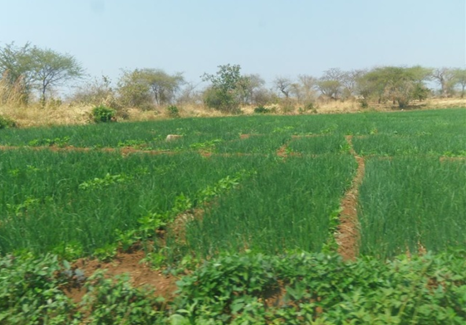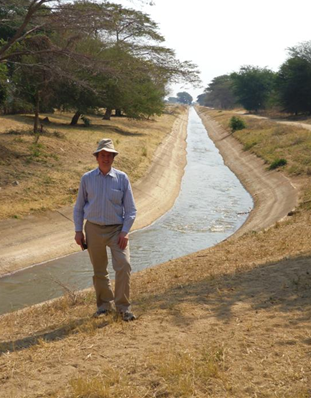The project “Increasing irrigation water productivity in Mozambique, Tanzania and Zimbabwe through on-farm monitoring, adaptive management and Agricultural Innovation Platforms” aims to find means of meeting the African government’s plans for greater food security while using limited water resources more sustainably. The project is funded with $3.3 million from the Australian Government via the Australian International Food Security Research Centre (AIFSRC) of the Australian Centre for International Agricultural Research (ACIAR), with additional contributions from participating organisations.
A trans-disciplinary team has been assembled to address the recalcitrant problems of poor yields, low profitability leading to under-investment in infrastructure, market failure and degradation and abandonment of irrigated lands. The project will be led in Australia by the UNESCO Chair in Water Economics and Transboundary Water Governance at The Australian National University, with contributions from CSIRO Land and Water and the University of South Australia. Partners in Africa include the Food and Natural Resources Policy Analysis Network (FANRPAN), International Centre for Crop Research in the Semi-Arid Tropics (ICRISAT), the University of Pretoria, Ardhi and Sokoine University of Agriculture in Tanzania, and the National Institute for Irrigation in Mozambique.

An estimated one in four people go hungry in Africa; it is the region with the largest proportion of people living in extreme poverty. At the same time the agricultural potential of Africa is considered enormous; in terms of uncultivated farming land, reserves of exploitable water and in the levels of productivity that can still be achieved. Irrigation is under-developed in sub-Saharan Africa, and could potentially make a significant impact on food security.
This project builds on a scoping study that reviewed the work of International Water Management Institute, International Food Policy Research Institute, World Bank, Challenge Program, Gates Foundation and others on how irrigation could contribute to food security in nine sub- Saharan African countries. The region seeks investment of 10% of national budgets to increase agricultural production at six times the current rate under the African Union’s Comprehensive Africa Agricultural Development Program initiative. The land and water resources for such expansion are theoretically available.
Set against these agricultural expansion plans are i) a history of irrigation in the region failing to provide adequate return on investment, ii) weak market integration and weak water governance institutions, and iii) significant degradation and abandonment of irrigated land. Further, surface water is scarce and subject to competition in key river basins, such as the Limpopo and Rufiji. Despite these drawbacks, irrigation expansion will take place, and so research is needed to increase water productivity, the economic value per volume of water consumed. It is also needed to mitigate environmental degradation in current and new irrigated lands.
There are no “silver bullet” interventions to improve water productivity in Africa. The irrigation ‘problem’ is systemic in that there is failure at several levels including technical capacity, institutional arrangements and market linkages. These hurdles include the need i) to develop water resources within the sustainable limits of the catchment / aquifer, ii) to schedule water and nutrients to enable high crop yields, iii) for farmers to actively participate in the value chain to ensure there is sufficient profit for investing in operation & maintenance costs and purchasing inputs and iv) for farmers to participate in governance arrangements that ensure efficient and equitable distribution of water.
In response to such complex problems, an FAO (2012) report calls for the introduction of adaptive management approaches that will lead to social and institutional learning. This project seeks to implement such a program by deploying on-farm monitoring of water applied, soil water, nitrate, salt and groundwater depth and using this as a basis for identifying options for improving water productivity. At the same time the project will use existing farmer organisations as a basis for establishing agricultural innovation platforms which comprise farmers, political representatives and players across the market value chain in order to identify obstacles and stimulate opportunities for change. The platforms will consider water productivity as well as other constraints to irrigated agricultural productivity.
The objectives are to:
- Develop, test and deploy innovative water and solute monitoring systems to stimulate farmer learning toward greater water productivity.
- Evaluate whether agricultural innovation platforms, based on existing community organisations can identify and overcome institutional and market barriers to greater water productivity.
- Identify and communicate economic and policy incentive mechanisms for greater water productivity.

The project is expected to work directly with approximately 5,000 smallholder irrigator households in six or more irrigation areas in Tanzania, Mozambique and Zimbabwe. The research will model the adaptive learning and innovation platform approach with government and non-government organisations so that they may scale up application to benefit hundreds of thousands of smallholder irrigator households in the region. The project intends to influence national and multi-lateral policies for water, agriculture and food security by providing evidence to enhance sustainability components concerning water and small holder-irrigation.
The project started in July 2013. In August, representatives from all partner organisations attended an inception workshop held in Maputo, Mozambique. The project will conclude in 2017.
